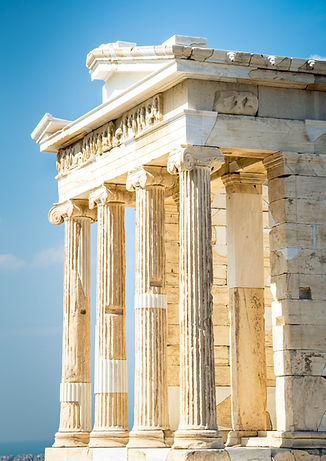
Accessible
Peloponnese and Mainland
The Peloponnese region and the Mainland of Greece offer plenty of interesting things to do as well as to experience various touristic alternatives such as ancient Greek history. The examples are to visit Olympia (where the Olympics was born), and Mycenae (home of Agamemnon), the Ancient Theater of Epidaurus and much more. The landscapes are a mix of mountains, beaches, and olive groves that will make you wish you could stay forever. The region offers one of the best gastronomic areas, where you can enjoy authentic Greek cuisine. For those interested in religion, there is a chance to explore the legacy of Byzantine churches and monasteries. So, if history, stunning scenery, and food, are your desires, the Peloponnese is calling your name!
Wheelchair Friendly Attractions in the Peloponnese and Greece's Mainland

Accessible Corinth
The Corinth Archaeological Site is an ancient marvel in the Peloponnese region. This once-powerful city-state reveals remnants of temples, ancient roads, agoras, and baths, offering a glimpse into vibrant ancient Greek life.
In the area, there is the impressive Corinth Canal, connecting the Gulf of Corinth with the Saronic Gulf. The canal cuts through the narrow Isthmus of Corinth, effectively separating the Peloponnese peninsula from mainland Greece.



Ancient Nemea for wheelchair travelers
Ancient Nemea is renowned for its association with ancient mythology and houses a remarkable archaeological site. Once the venue for the legendary Nemean Games, honoring Zeus, offering you chance to explore the well-preserved ruins of the majestic Temple of Zeus, the ancient stadium, and other structures linked to this celebrated event. The place transports you back in time, envisioning the grandeur of the ancient games and the sacred significance of this site.
Meteora is a UNESCO World Heritage site in central Greece known for its towering rock formations and monasteries. Built in the 14th century, the monasteries served as sanctuaries for monks seeking isolation, offering breathtaking views. Some monasteries might be partially accessible via stairs and pathways. Meteora is a unique blend of human architecture and natural wonders, attracting tourists and those interested in cultural and historical marvels.


Accessible Meteora

Pella Archeological Site
Pella is an archaeological site in northern Greece and was once the ancient capital of the Kingdom of Macedon, birthplace of Alexander the Great. The site, extensively excavated, reveals the layout of a classical city with well-preserved structures, streets, and mosaics. There you will find the Macedonian palace complex, public buildings, and private houses.
Pella provides valuable insights into ancient Greek urban planning and architecture, making it a significant archaeological and historical destination.



Archaeological Site of Aigai
Located near the modern town of Vergina in northern Greece, it is an important historical site associated with the ancient kingdom of Macedon. It was the first capital of Macedon and the burial place of the royal family, including Philip II, father of Alexander the Great. Here it is possible to see royal tombs, a palace complex, and various artifacts, showcasing the richness of Macedonian culture. The highlight is the Great Tumulus, where the royal tombs have been discovered, offering insights into the powerful Macedonian civilization of the 4th century BCE. The Archaeological Site of Aigai is recognized as a UNESCO World Heritage site.
Source of information: https://www.visitgreece.gr/

Ancient Theater of Epidaurus
The extraordinary Ancient Epidaurus is situated in the northeastern Peloponnese of Greece. This renowned archaeological site is famed for its exceptionally well-preserved theater and healing sanctuary, dedicated to Asclepius, the god of medicine. The Epidaurus theater stands as a masterpiece of ancient Greek architecture, revered for its exceptional acoustics that ensure every spectator can hear even the faintest sound in the vast amphitheater.

The ancient city of Olympia, the birthplace of the ancient Olympic Games. You will be able to gain valuable insights into the origins of the Games and the profound significance they held in the ancient world's culture, both in athletics and religious practices. Explore the ruins of the ancient stadium, temples, and other structures that offer a deeper understanding of the rich history behind this legendary site.


Ancient Olympia


Archeological Site Mycenae
The Archaeological Site of Mycenae is an ancient city steeped in mythology and history. It was a major center of the Mycenaean civilization, flourishing from the 16th to the 12th century BCE. The site is renowned for its impressive Cyclopean walls, the iconic Lion Gate, and the Treasury of Atreus, a monumental tholos tomb.
An interesting fact is that Mycenae played a significant role in Greek mythology, being associated with the legendary figures of King Agamemnon and the Trojan War. You will be able able to learn more facts here.







